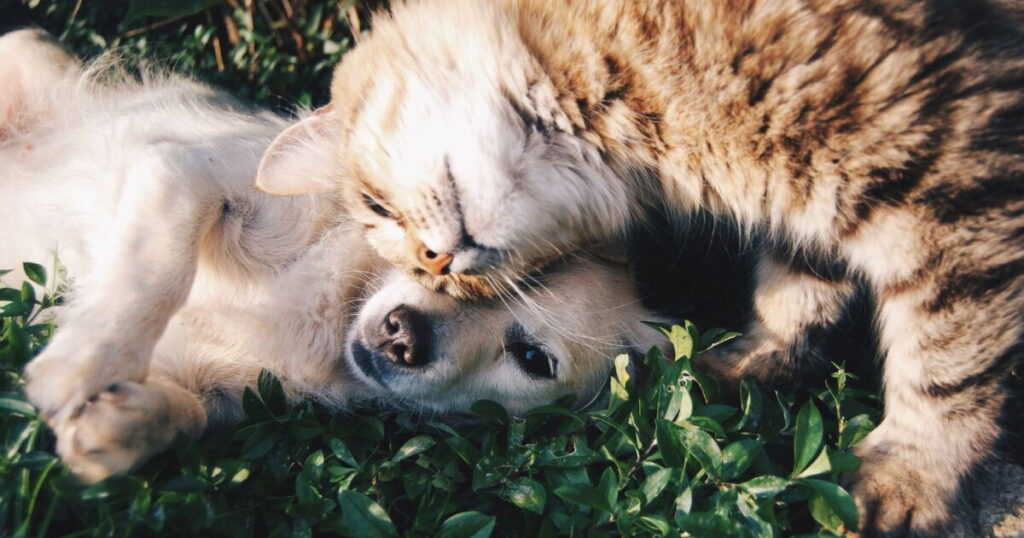
In recent years, mutual insurance companies have offered to insure your dog, your cat and even your rabbit! Financial boost or scam? We asked owners and a veterinarian. Opinions differ.
Living with an animal can be expensive, especially when it needs to be looked after. SantéVet, Dalma, Assur O-Poil… In recent years, numerous mutual societies for dogs, cats and even for New Pets (NAC) have emerged. They offer reimbursement of veterinary costs, vaccines, sterilization, examinations and even euthanasia for some. Is it worth itinsure your companion ? We asked three pet owners and a veterinarian.
“He too has the right to his insurance”
For Manon, it is a big yes. The young Dijon resident insured her cocker spaniel Archie two weeks after his arrival in the house. “He is part of our family, he too has the right to his insurance”, she believes. Unfortunately, it was following a tragedy with their first dog that Manon and her partner decided to take out insurance. His illness and premature death necessitated significant veterinary costs. “From the moment we decided to take over a dogwe knew we were going to take a insurance. If we had taken one with Boby, our first dog, we would not have gotten one for as much.”she notes.
Marie is just as reassured to have mutual insurance for your dog. “I have a cocker spaniel, it’s a breed of dog that is very prone to ear infections and eye infections…” and therefore requires several visits to the veterinarian. “This summer we went 4 times at the vet in a few weeks, between spikelets and ear infections.” This could have weighed on the budget, but his insurance covered part of the costs.
The two women chose Dalma, an animal insurance available as a mobile application, which also offers physical or remote consultations with a veterinarian. Active on social networks, Marie was contacted by the insurance company for a partnership. For the moment, she is not paying for it, but satisfied with the service, she plans to keep the mutual at the end of the collaboration. “It really is one less stress to know that my dog is insured.”
Alice has no not had a good experience with his insurance. Upon his arrival in the family, his cat Narya contracts an illness. In a panic, she and her partner decided to take out mutual insurance to cover the numerous veterinary costs and medications. “Our clinic recommended one to us. We made a quote, but at the time, we weren't sure about Narya's illness. We misread the contractwe were worried.” Problem: her cat has feline infectious peritonitis (FIP) which is not not covered by insurance. “It is a disease transmitted by peers, it was not included in our contract”, she laments. To save their animal, the young couple then pays for all the appointments and the very expensive treatment at their own expense, in addition to the insurance, the contract of which could not be canceled in the first year. For them, mutual insurance is over. “I don’t want to take one again, it’s made me cold”she confesses.
Some pitfalls to avoid
Mutual insurance can be expensive. Its subscription must be done seriouslyadvises Dr. Jean François Rousselot, veterinarian. “It is not necessary don't wait until your pet is sick to ensure it”, indicates the President of the French Association of Veterinarians for Pets (AFVAC). In his eyes, insuring his animal is relevant. This allows you to avoid surprises and to be able to provide care to your dog or cat without incurring excessive costs. He advises to take out mutual insurance as soon as possible, “as soon as he arrives in the home”. “I have no interest in insurance, but I see the help it brings” to the owners he meets at his office.
Taking out insurance for your four-legged companion requires the same vigilance than for a human. It's necessary read contracts carefullyask about, “wading into the sphere of mutual insurance for animals”jokes Manon. “Some don’t insure dogs before they are six months old”, she gives as an example. Indeed, we must pay attention to the waiting period. It corresponds to a period during which if the animal becomes ill or injured, the insured is not reimbursed. “For certain illnesses, the deadline is 120 days.” Which Marie confirms. “The waiting period, as with all insurers, you have to pay attention to at the beginning.”
It is also necessary to check the reimbursement rate which can range from 50 to 70% for basic formulas, up to 90 to 100% for premium formulas.
List your expectations can help. This is what Manon did. His criteria boiled down to ratein the amount of annual reimbursement caphas ease of repayment And its speed. “With the package we took”which costs him €40 per month, “Our first veterinarian bill was 100% covered by the mutual insurance company.”
It is also necessary look at the reasons for exclusion because some insurances may include certain breeds, age or history of the animal. Finally, some mutuals add additional costs which inflate the price.
Should we insure all animals, even the most robust?
“We don’t go to the vet every four morning”, when the animal is well, notes Alice. Manon is of the same opinion. It may depend on the breed. If she chose to insure her cocker spaniel, her parents, who adopted a crusader Pyrenees mountain and Australian shepherd, don't think about it. “Their dog is a big country dog, a cross.”, less prone to disease or health problems than purebreds.
The young woman gives herself a year before seeing if she will keep her mutual insurance, “maybe we’ll stop between the ages of two and nine” if the dog does not have too many health problems.
You may also be interested in:
⋙ Dog, cat: what should I do with my pet during the holidays?
⋙ Bulimia, anorexia: can cats and dogs suffer from eating disorders?
⋙ How do I know if my cat or dog is overweight?
⋙ Aspirin, paracetamol: should not be given to dogs or cats




